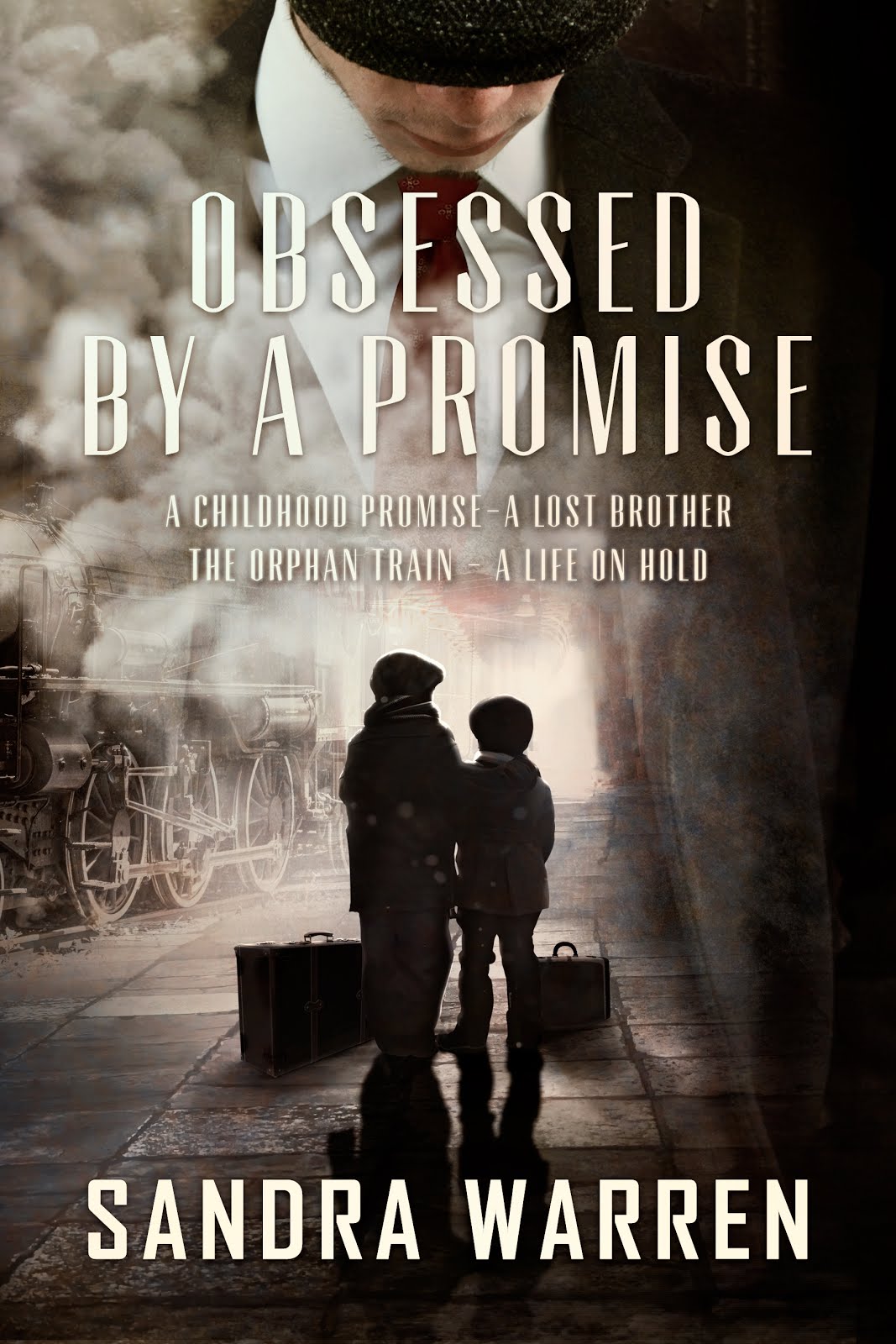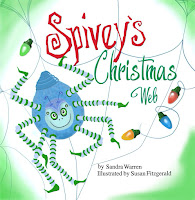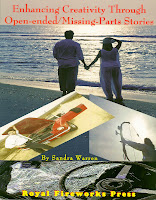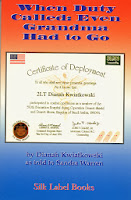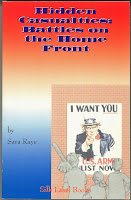In the previous posts we've discussed questions to incorporate into author/illustrator presentations. Part 1 covered Your Own Personal Story and Part 2 talked about How you work. Today, we'll discuss Your Published Work.
Here are some questions & answers to consider incorporating in your next presentation:
Your Published Work
What was your first book?
How many books have you written/illustrated?
How did you get the job? And/or find the publisher?
How did it feel when you were told it would be published?
How did it feel when you saw your book for the first time?
How did you work with the illustrator (if appropriate)?
Where did you get your idea for the book?
How many times did you have to rewrite it before it was published?
How long did it take to write the story?
Where you told what the characters should be or did you decide for yourself?
How did you decide what the characters would look like?
How do you decide what else to put in the picture?
Do you have the original drawings for the book?
Do you like the way the finished book looks?
Did you have to change anything about the story?
Are you writing a sequal?
What will your next book be?
When will it come out?
Incorporate some of the answers to these question into your presentations and you'll have enhanced your presention to gold star status.
Now you know the 3 things audiences expect from an author or illustrator presentation: Part 1 - Your Personal Story, Part 2 - How You Work and Part 3 Your Published Work/s
Hopefully, these suggestion have inspired you to beef up your presentation.
School Visits & Presentations - Part 3 - Your Published Work
Monday, August 15, 2011
Posted by
Sandra Warren
at
8:00 AM
0
comments
![]()
![]()
School Visits & Presentations - Part 2 - How You Work
Friday, August 12, 2011
In a previous post - Part 1 - Your Personal Story, I shared questions to answer for dynamic school visits and presentations.
Today we'll discuss Part 2 - How You Work
I can pretty much guarantee that your audience, whether senior citizens, PTA parents or children in schools, will all want to know how you as an author or illustrator work. So here are some questions to consider answering to beef up the quality of your presentation:
Part 2 - How You Work As A Writer or Illustrator:
Writer:
Where do your ideas come from?
Do you outline first?
Do you have anyone check your story before you send it to a publisher?
How do you know you're idea is good enough to publish?
How do you decide what kind of book to write?
Do you work in a quite atmosphere or do you need music in the background? a crowd in a coffee shop?
What do you use for inspiration?
Have you ever had writer's block? If so, how did you get out of it?
Do you write every day?
How many hours a day do you write?
Have you ever had a story rejected?
How does it feel to get rejected?
How many rejections have you received?
Have you ever won any awards?
What is the hardest part about writing for you?
What is the easiest?
How many books have you had published?
How do you/did you find a publisher?
Did you have to choose your own illustrator?
What advice can you give to an inspiring writer?
Illustrator:
Where do your ideas come from?
What medium do you use most often?
What is your favorite medium to use?
Do you sketch things first in pencil or marker?
What size drawing do you do to illustrate a book?
How many sketches do you do before you decide which one will be in the book?
What kind of research do you have to do to illustrate a book?
Do you work with the author when you illustrate a book?
How do you know how many illustrations are needed for a book?
Do you get to choose how many illustrations to do or does someone tell you how many?
What medium do you use with a finished illustration?
Do you get to keep the illustrations after they are put in a book?
Where do you work?
What does your office look like?
Do you work in a quiet atmosphere or do you have music playing in the background?
If you listen to music at work, what kind of music inspires your images?
Have your illustrations ever won any awards?
What happens if the author doesn't like your illustrations?
Has that ever happend to you?
Answers to all or some of these questions mixed with anecdotes and personal stories will enhance your presentation immensely.
Stay tuned for Part 3 - Your Published Work - on Monday
Posted by
Sandra Warren
at
8:00 AM
1 comments
![]()
![]()
School Visits & Presentations- Part 1 - Your Personal Story
Wednesday, August 10, 2011
One of the perks, at least in my mind, of being a published author, is sharing the work you love with others. You don't have to be a children's author or illustrator to do it. So don't panic when the call comes. You've lots to share.
I believe that audiences in general as well as educators and students are looking for 3 basic things from a visiting author or illustrator. They want to know about 1) Your personal story 2) Your published work, and 3) Your process or How you work.
Incorporate these three elements into your presentation to give your audience a dynamic experience.
Part 1 - Your Personal Story
Did you always want to be a writer/illustrator?
How old were you when you knew you wanted to write/illustrate?
Did you go to college or take extra classes to learn how to write/illustrate?
Does anyone else in your family write/illustrate?
Where do you write?
What does your office look like?
When do you write? How many hours a day?
What is the best part about being a writer/illustrator?
Who is your favorite author/illustrator?
Who encouraged you to be a writer?
What do you like to do when you're not writing?
Why do you write?
Does writing/illustrating come easy to you?
Do you write/illustrate in more than one field?
Incorporate the answers to all or part of these questions in your presentation and you'll be on your way to a dynamite school visit experience.
Posted by
Sandra Warren
at
8:00 AM
0
comments
![]()
![]()
Writing Can Be DANGEROUS to Your Health!
Sunday, August 7, 2011
"Have you been sitting for unusually long periods of time?" the doctor asked.
Well, yeah! I'm doing a complete rewrite of a novel and I can't do that standing. That's not the way I explained myself to him. I was more polite than that. The fact is, I have been sitting and sitting and sitting. Now, I have what's called, "I.T. Band Friction Syndrome" which means that my right leg hurts like H### and I can hardly walk.
The cure? Don't sit for long periods, do a series of painful stretching exercises and even more painful, roll a hard foam roller up and down your leg several times a day. Try that without screaming.
Well, since I refuse to give up progress on my novel rewrite, I had to come up with a less stressful, less painful way of sitting. So, guess what I did? I got on the ball...literally! I chased the dust bunnies off the 26" exercise ball that was wedged in between my StairMaster and Total Gym, pumped it up and began using it as a chair. Surprisingly, it worked! Not only has it helped my leg problem, it's also strengthened my stomach muscles which in turn helped my aching back. The bonus is ideas now roll around or bounce around my brain in unison with my body. (Bounce--get it? You can bounce while you think.)
So, if you have trouble putting your BUTT IN CHAIR to get projects done, try BUTT ON BALL instead. You just might find it as therapeutic I did. Caution: Just don't nod off to sleep on it. You'll be launched across the room so fast you won't know what hit you.
Has writing been hazardous to your health? Please share.
Posted by
Sandra Warren
at
9:05 PM
2
comments
![]()
![]()
Pay Yourself First!
Monday, April 11, 2011
When budgets get tight, financial advisors will tell you to "pay yourself first," by putting any amount of money, even as little as five dollars, into a savings account. It occurred to me this morning that the idea of "paying yourself first" with money could also be applied to writing by "paying yourself first" with time.
Time in front of the computer is GOLDEN for writers. It used to be that when you sat down to your typewriter all you had to do was process your wonderful thoughts and creative ideas to the page. Now, when you finally find the time to turn your computer on, up pops email messages, twitter tweets, facebook posts and blog comments. Pay attention to them first and your day flies by with nary a new word or sentence applied to your manuscript.
Theresa, one of my critique partners, vowed to get up each morning and work on her manuscript for 3 hours no matter what. I think of her each morning when I sit in front of my computer. When I "pay myself first" that 3 hours often turns into 4 or 5 and strangely, I still find the time to email and facebook, twitter and blog.
Come on. "Pay yourself first" with time. You'll be glad you did.
Posted by
Sandra Warren
at
11:19 AM
2
comments
![]()
![]()
When Students Have Questions
Monday, January 31, 2011
I don't know about you but when I give presentations I pack all the information I can into the alloted time frame with little left over for student's questions. Consequently, students bombard me at the end only to be whisked off to their classrooms before I can answer. This always bothered me. I felt something had to be done. Here is my secret to solving this problem.
I no longer take questions during my presentation/s but instead build in a "Student Press Conference." It is one of the components of the package I offer schools, i.e. two large group sessions, one small and a "Student Press Conference." I have to admit, teacher's LOVE it!
Here's how it works:
Prior to the visit, each teacher is asked to hold a brainstorming session in their classroom. They challenge their students to come up with a list of questions to ask me, the visiting author. This enhances the visit for students by expanding their questioning techniques as well as learning what might or might not be an appropriate question.
Each classroom teacher selects TWO Student Reporters. These Reporters will bring the questions from their classmates to the Press Conference
This small group of Student Reporters, 2/classroom, will meet with me at the end of the day to ask their questions in a press conference format.
It is the Student Reporter's responsibility to report my answers back to their respective classrooms.
During the Press Conference, I will sit with the small group (two/classroom) and go from student to student answering their questions one at a time. We will go around and around the room until all questions are asked or time runs out.
The "Student Press Conference" is held at the END of the day in whatever time frame is available. I've had anywhere from 20-minutes to 50-minutes. I stress the end of the day for good reason. If you have it in the middle of the day, students will be asking questions that you will be addressing in your presentation.
Additional tidbits:
1. The small gathering of Reporters might range in grade level from K to 5th or even 6th grade. All grade levels meet with me at the same time. This age/grade span has never posed a problem for me. In fact, some of the younger students ask more in-depth questions than the older students. And often older students will help the younger ones record my answers.
2. Some questions will be duplicates so you have to caution the students to listen carefully and ask a different question.
3. I've done this session on closed-circuit TV and/or allowed for it to be taped for selective viewing later. (Some teachers aren't interested in the Q&A session.) I've even had a class of gifted students record the session as part of their video/film making class.
4. On a few occasions, interested classroom teachers requested to have their students return to the auditorium to LISTEN IN on the press conference. In this case I sit on stage with the Reporters as they ask their questions. What is really great about this situation is that if you run out of questions, you can turn to the audience and take additional questions. This has happened on several occasions, much to everyones delight.
The "Student Press Conference" idea evolved out of a need to allow students to have all their questions answered, questions that go beyond the, "what is it like to be an author?" ones. You never know who you will touch in the audience. Something you say might just be the motivation that produces a Putlizer Prize winner or Newbury recipient down the road.
I just felt there had to be a more educational way of giving more to the students. "My Student Press Conference" fills the bill.
And as I said earlier, Teachers/Administrators/Parents LOVE my "Student Press Conferences." And I must admit, it's the best part of the day for me also.
If you try this, let me know how a "Student Press Conference" works for you.
Posted by
Sandra Warren
at
2:25 PM
2
comments
![]()
![]()
Be Thankful for Helpful Rejection Letters!
Saturday, January 15, 2011
Can it really be that many months since I "finished" my novel? Finish is in quotes because we all know that a novel is never finished until the editor signs off and sends it to print. I thought I was until an agent said otherwise and kindly - no, that's not the word, bluntly is more like it - turned it down. But, lucky for me, within the body of that, "no thanks," were several clear, concise suggestions for a rewrite.
The rewrite has begun and as I re-read that detailed rejection letter, I can only think how grateful I am for agents who take the time to make constructive suggestions, even when they plan to say, "no."
Tell me about a rejection that movitated and helped you.
Posted by
Sandra Warren
at
3:25 PM
2
comments
![]()
![]()
Be Thankful for Delays!
Monday, January 10, 2011
Late last fall, I heard from two agents about a novel manuscript I'm trying to place. One loved it and the other had a lot to suggest. After much introspection, I decided that revision was in order. But since that time, life intervened. Family traumas and professional obligations, not to mention the holidays, jumped in to delay physical work on the project. I had spent countless hours mentally contemplating how to approach the revision and had settled on a new beginning, but I just hadn't had the time to do the work. The delay had been frustrating until yesterday when I opened a blog on revision that stopped me in my tracks.
The blog post was titled, Five Questions to Ask Yourself Before You Start Revising, an interview with Kendra Levin, an associate editor at Viking. Within the body of the post was a plot diagram. I've seen similar diagrams multiple times and am aware of the importance of the way your story builds, but this time, for some reason, it hit me smack dab in the face. My new attention-grabbing beginning just wasn't going to work. Starting with the definitive event that turns the character on his heels and begins his healing, is not the way to begin.
So, I'm grateful for delays. Had I been physically working on the revision over the last two months, I would have worked in vane. Now, when I open the computer and begin the process, I'll be on the right track.
I'm learning to appreciate delays.
Have you ever had a delay that changed your story for the better?
Posted by
Sandra Warren
at
5:48 PM
0
comments
![]()
![]()
